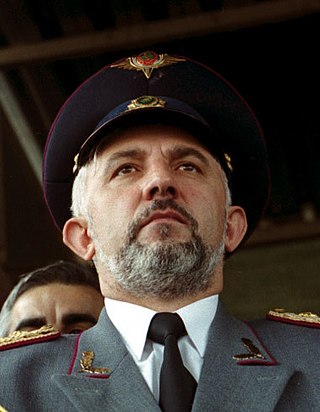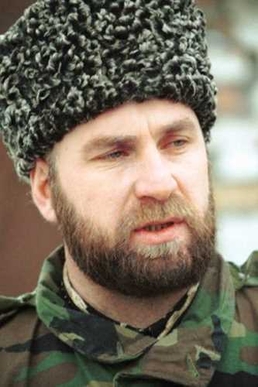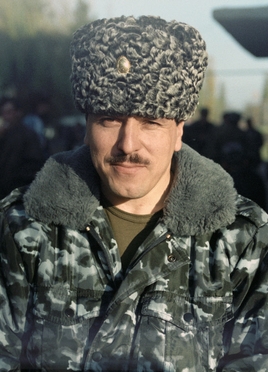Interwar period
On 30 December 1997 Khultygov became acting director, and from 6 January 1998, director of the National Security Service, replacing Apti Batalov in this position . [2]
During the Chechen interwar period, Khultygov repeatedly and publicly called on his colleagues to stop political intrigues and recognize Aslan Maskhadov's authority. He also positioned himself as an initiator and determined fighter against crime. He declared former armed resistance fighters involved in criminal crimes as enemies of the Chechen state and people, and was the first to admit that a number of influential field commanders and participants in the war were involved in gangs. In this struggle, Khultygov considered it possible to apply the most stringent measures. He was one of the first to put forward the idea of public shootings. The first such shooting, which took place in the center of Grozny in August 1997, caused a wide response in the Republic and abroad. The prestige of Khultygov in Ichkeria grew greatly after this event, which was primarily due to the complex criminal situation in Ichkeria at that time. [3]
Under him, National Security Service(NSS) was purged, and he took measures to improve the professionalism of employees. [3] In February 1998, at least two heads of departments and their deputies, four heads of departments and their deputies, and more than 20 operational employees were dismissed. In March, the resulting vacancies were filled by vertical movement of employees. Three months later, a second recertification was carried out. [2]
In early 1998, the situation in Ichkeria worsened due to the Wahhabis, who imposed their interpretation of Islam on the population. Khultygov made a public statement in which he argued that their actions directly contradicted the national traditions of the Chechens. He also argued that the situation was destabilized by agents of foreign intelligence services, including from Muslim countries, such as, for example, Turkey and Pakistan, pursuing mercenary goals. At the same time, Khultygov advocated cooperation with the Russian special services. He did not limit himself to words: in December 1997, he visited Moscow, where he established contacts with the leadership of the FSB to fight crime and terrorism. [3]
In the spring of 1998, as a result of joint actions by the NSS and the Anti-Terrorist Center, several dozen militants were detained. A number of foreign citizens who preached religious extremism and intolerance were expelled from the country. These actions provoked a sharp reaction from radical Islamists, who subjected Khultygov to harsh criticism. A group of senior religious and government officials appealed to Maskhadov with a demand to remove Khultygov from the NSS leadership. However, the President of Ichkeria supported Khultygov's actions. [3]

The First Chechen War, also known as the First Russo-Chechen war, was a war of independence which the Chechen Republic of Ichkeria waged against the Russian Federation from December 1994 to August 1996. The first war was preceded by the Russian Intervention in Ichkeria, in which Russia tried covertly to overthrow the Ichkerian government. After the initial campaign of 1994–1995, culminating in the devastating Battle of Grozny, Russian federal forces attempted to seize control of the rest of the lowlands and the mountainous area of Chechnya, but they faced heavy resistance from Chechen guerrillas and raids on the flatlands. Despite Russia's overwhelming advantages in firepower, manpower, weaponry, artillery, combat vehicles, airstrikes and air support, the Chechen recapture of Grozny in 1996 and the resulting demoralization of Russian forces led Boris Yeltsin's government to declare a ceasefire with the Chechens in 1996, and finally, it signed a peace treaty in 1997.

Akhmed Halidovich Zakayev is a Chechen statesman, political and military figure of the unrecognised Chechen Republic of Ichkeria (ChRI). Having previously been a Deputy Prime Minister, he now serves as Prime Minister of the ChRI government-in-exile. He was also the Foreign Minister of the Ichkerian government, appointed by Aslan Maskhadov shortly after his 1997 election, and again in 2006 by Abdul Halim Sadulayev. An active participant in the Russian-Chechen wars, Zakayev took part in the battles for Grozny and the defense of Goyskoye, along with other military operations, as well as in high-level negotiations with the Russian side.

Aslan (Khalid) Aliyevich Maskhadov was a Soviet and Chechen politician and military commander who served as the third president of the unrecognized Chechen Republic of Ichkeria.

Alu Dadashevich Alkhanov is a Russian politician and the former president of Russia's Chechen Republic. He is a career police officer who fought within the ranks of the Russian Armed Forces during the First Chechen War. He was elected as president on 30 August 2004. On 15 February 2007, Russian president Vladimir Putin dismissed Alkhanov as Chechen president and appointed him a Deputy Justice Minister of Russia.

Salman Betyrovich Raduyev was a Chechen separatist field commander, from 1994 to 1999, who masterminded and was responsible for the Kizlyar hostage taking raid. His activities, in his role as a commander, made him "Russia's second most wanted man."
Sultan Geliskhanov is a former head of the state security service in the Chechen Republic of Ichkeria and a former field commander in the Chechen resistance against Russia.

Turpal-Ali Atgeriyev was a deputy prime minister, national security minister of Chechnya.

Hamzat (Ruslan) Gelayev (Russian: Хамзат Гелаев; Chechen: ГелагIеран Ӏабдулхьамидан воI Руслан, romanized: Gelaevhervan Abdul-Hamidan vol Ruslan was a prominent commander in the Chechen resistance movement against Russia, in which he played a significant, yet controversial, military and political role in the 1990s and early 2000s. Gelayev was commonly viewed as an abrek and a well-respected, ruthless fighter. His operations spread well beyond the borders of Chechnya and even outside the Russian Federation and into Georgia. He was killed while leading a raid into the Russian Republic of Dagestan in 2004.

The Chechen Republic of Ichkeria, known simply as Ichkeria, and also known as Chechnya, was a de facto state that controlled most of the former Checheno-Ingush ASSR.

Doku Khamatovich Umarov, also known as Dokka Umarov as well as by his Arabized name of Dokka Abu Umar, was a Chechen mujahid in North Caucasus. Umarov was a major military figure in both wars in Chechnya during the 1990s and 2000s, before becoming the leader of the greater insurgency in the North Caucasus. He was active mostly in south-western Chechnya, near and across the borders with Ingushetia and Georgia.
Movladi Saidarbievich Udugov is the former First Deputy Prime Minister of the Chechen Republic of Ichkeria (ChRI). As a Chechen propaganda chief, he was credited for the Chechens' victory on the information front during the First Chechen War.
Idris Gaibov is the Deputy Prime Minister of Chechnya in the government of Ramzan Kadyrov as of 2006. He is a former field commander of the Chechen Republic of Ichkeria.

Arbi Alautdinovich Barayev was a Chechen warlord and terrorist, who in 1996 became the founder and first leader of the Special Purpose Islamic Regiment (SPIR) in Chechnya.
The 1999 Russian bombing of Chechnya was Russian Air Force's military operation against the Chechen Republic of Ichkeria that was a prelude to the main part of the Second Chechen War. In late August and September 1999, Russia mounted a massive air campaign over Chechnya, with the stated aim of wiping out militants who invaded Dagestan the previous month.
Ibragim "Ibby" Khultygov is a Chechen-Russian politician and paramilitary commander, and a former counter-intelligence and security chief for the secessionist government in Chechnya.

Vakha Arsanov was a vice president in the Aslan Maskhadov government of the Chechen Republic of Ichkeria.

Supyan Abdullaev was the vice president of the Chechen Republic of Ichkeria. He was appointed to this position on 19 March 2007, by the President of Chechen Republic of Ichkeria, Dokka Umarov. He was considered the most senior figure after Umarov in the ranks of the Caucasian Emirate and a possible successor.
The 1998 abduction of foreign engineers took place when four United Kingdom-based specialists were seized by unidentified Chechen gunmen in Grozny, the capital of the unrecognized secessionist Chechen Republic of Ichkeria (ChRI). After more than two months in captivity, all four men were found brutally murdered, reportedly following a failed rescue bid. As of 2022, no one has been tried in this case.

Ramzan Adlanovich Akhmadov Russian: Рамзан Адланович Ахмадов; 4 February 1970 – 10 February 2001) was a brigadier general of the Chechen Armed Forces and commander of the Western Front during the First and Second Chechen Wars. He was also the founder of Chechnya's strongest military grouping, the Urus-Martan Jamaat. Ramzan was of the Gendargenoy teip and Appaz-Nek'e.














